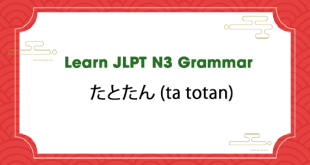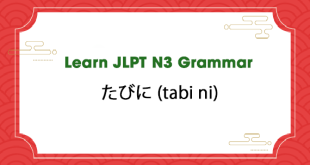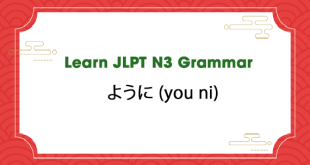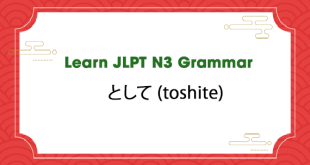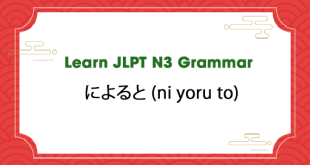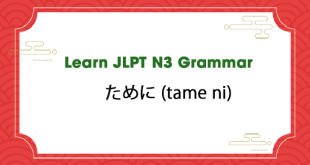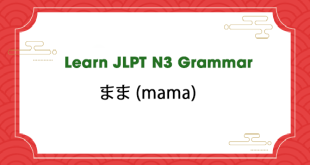Learn JLPT N3 Grammar: たとたん (ta totan) Meaning: the moment; the instant; as soon as How to use: Verb-casual, past + とたん(に) Example sentences: 1. 有名になったとたんに、彼は横柄な態度をとるようになった。 yūmei ni natta totan ni, kare wa ōheina taido o toru yō ni natta. As soon as he became famous, he became arrogant. 2. …
Read More »Grammar N3
Learn JLPT N3 Grammar: たびに (tabi ni)
Learn JLPT N3 Grammar: たびに (tabi ni) Meaning: each time, every time, whenever How to use: Verb-dictionary form + たびに Noun + のたびに Example sentences: 1. 彼女は会うたびに違うメガネをかけている kanojo wa au tabi ni chigau megane o kakete iru Every time I see her, I see her wearing a different kind of …
Read More »Learn JLPT N3 Grammar: ように (you ni)
Learn JLPT N3 Grammar: ように (you ni) Meaning: in order to (e.g. meet goal); so that How to use: Verb-dictionary form + ように Verb-ないform + ように Example sentences: 1. すべたがうまくいきますよう。 subeta ga umaku ikimasu yō. Wishing all the best 2. 新しい年が幸い多き年してありますよう祈ております atarashī toshi ga saiwai ōki toshi shite arimasu yō …
Read More »Learn JLPT N3 Grammar: として (toshite)
Learn JLPT N3 Grammar: として (toshite) Meaning: as (i.e. in the role of) How to use: Noun + として Example sentences: 1. 留学生として、この大学で勉強している。 ryūgakusei to shite, kono daigaku de benkyō shite iru. I am studying at this university as an international student. 2. 趣味として書道を勉強している。 shumi to shite shodō o benkyō …
Read More »Learn JLPT N3 Grammar: によると (ni yoru to)
Learn JLPT N3 Grammar: によると (ni yoru to) Meaning: according to How to use: Noun + によると Example sentences: 1. 天気予報によると、明日は雨が降るそうです。 tenkeyohō ni yoru to, ashita wa amegafuru-sōdesu. According to the weather forecast, it will rain tomorrow. 2. あの雲の様子によると、明日は多分晴れるだろう。 ano kumo no yōsu ni yoru to, ashita wa tabun harerudarou. …
Read More »Learn JLPT N3 Grammar: ために (tame ni)
Learn JLPT N3 Grammar: ために (tame ni) Meaning: because of; as a result of How to use: Verb-casual + ため(に) Noun + のため(に) Example sentences: 1. 世界平和のために国際会議が開かれる。 sekai heiwanotameni kokusai kaigi ga aka reru. An international conference is held for world peace. 2. 入場券を手に入れるために朝早くから並んだ。 nyūjō-ken o te ni ireru tame …
Read More »Learn JLPT N3 Grammar: きり (kiri)
Learn JLPT N3 Grammar: きり (kiri) Meaning: only; since; after Explain: Describes an event after it happened, but the event did not change and the situation remained the same. How to use: Verb-casual + きり/っきり Noun + きり/っきり Example sentences: 1. 彼は卒業して日本を出ていったきり、もう5年も帰ってこない。 kare wa sotsugyō shite Nihon o dete itta …
Read More »Learn JLPT N3 Grammar: としたら (to shitara)
Learn JLPT N3 Grammar: としたら (to shitara) Meaning: if it were the case that…; if we assume… Explain: Expressing hypothetical wishes How to use: Verb-casual + としたら いadj + としたら なadj + だとしたら Noun + だとしたら Example sentences: 1. 家で建てるとしたら、大きい家がいい。 ie de tateru to shitara, ōkī ie ga ii. If …
Read More »Learn JLPT N3 Grammar: まま (mama)
Learn JLPT N3 Grammar: まま (mama) Meaning: as it is; still in the same state Explain: Describe the situation unchanged, continue the same story How to use: Verb-casual, past + まま Verb-ないform + まま Noun + のまま Example sentences: 1. 年をとっても、きれいなままでいたい。 toshi o tottemo, kireina mama de itai. Even though …
Read More »Learn JLPT N3 Grammar: ほど (hodo)
Learn JLPT N3 Grammar: ほど (hodo) Meaning: to the extent that; so much… that Explain: With the form of 「AほどBだ」, this sentence pattern expresses the idea that “As the level of A increases, the level of B also increases”. How to use: Verb-casual, non-past + ほど なadj + なほど/であるほど Noun …
Read More » Learn Japanese Learn Japanese
Learn Japanese Learn Japanese
